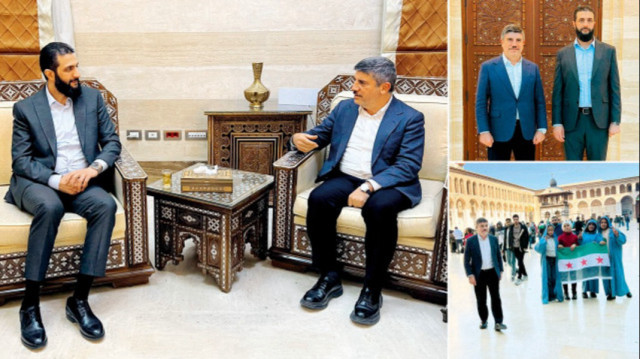
The leader of the forces that ended the Ba'ath regime, Ahmed al-Shara (Abu Muhammad al-Julani), gave his most comprehensive interview to Yeni Şafak. Responding to questions from our columnist Yasin Aktay, al-Shara stated, "We prayed to Allah for this—victory without revenge. Because if a revolutionary loses their morals, they lose everything. Thank God, we succeeded." Al-Shara emphasized that the victory was not solely for the Syrian people, adding, "It is also a victory for sincere people, like the Turkish people, because the oppressed triumphed over the oppressors."
After a 13-year-long arduous, destructive, and tumultuous struggle in Syria, Ahmed al-Shara (Abu Muhammad al-Julani), the leader of an unprecedentedly clear revolution achieved in just 13 days, is a figure who was avoided until 20 days ago due to perceptions and rumors surrounding him. Now, because of his exceptional victory, he has become a politician whose ideas are sought after by journalists and a statesman whom presidents and diplomats compete to engage with. Determined to witness this revolution that promises to reshape history, we set out for Syria for the first time in 14 years. We began our visit with an interview with Ahmed al-Shara, the leader of the revolution. Passing through the enthusiastic crowds in Hamidiye Square, who were celebrating as if freed from a prison, we headed to the nearby Prime Minister’s Office for the interview.
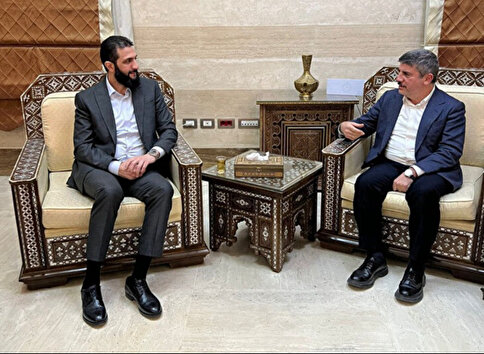
Al-Shara welcomed us punctually and with a calm, modest, and sincere demeanor, showing a deep understanding of the issues. He has embraced the necessity of transitioning from the mindset of a freedom fighter to that of a statesman. Reflecting on the governance of Idlib, he acknowledged that it served as a form of apprenticeship but stressed that managing the Syrian state entails far greater responsibility, energy, and capability.
Sednaya Prison Will Become a Museum
President, congratulations on this great victory. You have overthrown the Ba'ath regime, which reigned as a closed and oppressive force for 61 years, and the Assad family dictatorship of 54 years, liberating the Syrian people. The world now better understands the darkness of this regime through the images from Sednaya. Mass graves, torture devices, and prison conditions have come to light. These are terrifying truths. On the day these images began circulating globally, coinciding with Human Rights Day, the regime's crimes became undeniable evidence of your justified struggle. Are there plans to turn Sednaya Prison into a museum?
Al-Shara: Sednaya Prison witnessed atrocities. People were killed, crushed in iron presses, burned with acid, and incinerated in furnaces. These tragedies extend beyond Sednaya to countless other missing individuals, as security branches across Syria were common tools of oppression. This prison is a black mark in Syrian history, yet the rescue of its captives was a moment of triumph. Our primary duty is to document these crimes and legally prevent their recurrence. We will prosecute everyone responsible for these acts, within Syria and abroad, confiscating their assets for the Syrian state. As for Sednaya, we plan to preserve it as a museum and monument—a testament to the regime's crimes and its cruelty toward the Syrian people.
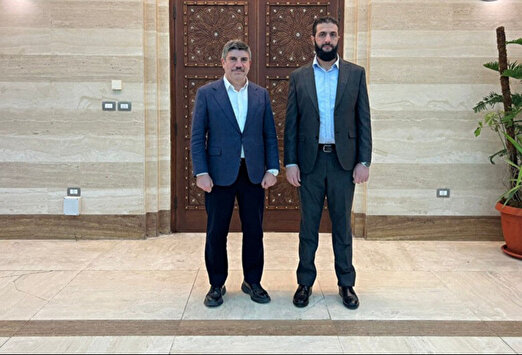
A Rapid, Unprecedented Revolution
This revolution began under your leadership. Didn't everything unfold too quickly? Many find it hard to believe that the Assad regime collapsed in just 13 days. Was it truly that easy?
Al-Shara: It was far from easy. The regime had a vast army and extensive weaponry. The military was well-trained, fighting day and night with advanced equipment. But most importantly, this was Allah’s victory. The strategy was to achieve quick success, and in this battle, a unique form of warfare emerged. I believe it will be studied and taught in major universities in the future.
No Agreements with Foreign Powers
There are claims that an agreement among Russia, Iran, and even the U.S. played a role in this rapid outcome. Specifically, some suggest that Russia and Iran abandoned Assad, contributing to your success. What do you say to this?
Al-Shara: No, there was never an agreement. On the contrary, there were valid concerns about entering this war, given the heavy bombardments and massacres our people had endured in the past. But we were determined to free ourselves from this oppressive system. Syria was like a giant prison, and when the people were liberated, it was as if the entire nation rejoiced in freedom.
Prioritizing Stability and Solutions
Now that you have moved from leading a revolutionary process to taking over governance, are you prepared to manage a state? What are your immediate priorities?
Al-Shara: First, we must adopt a state-building mindset. While the revolution is a proud part of our history, we cannot approach governance with a revolutionary or opposition mentality. We are working on strategic plans with short-, medium-, and long-term goals. Our immediate priority is stability and providing basic services, such as security, electricity, food, and fuel, to enable people to lead decent lives temporarily. Concurrently, we aim to develop strategic solutions for the problems left by the regime, including infrastructure, the economy, human resources, and reforms in the judiciary, police, and military. Syria faces numerous challenges, and addressing them intelligently requires breaking them down into manageable parts to achieve realistic results.
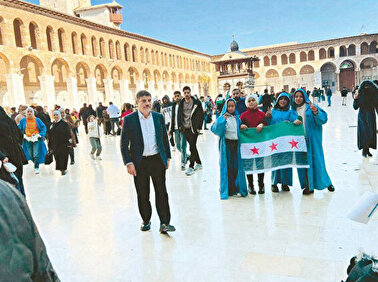
Relations with Türkiye
What are your plans for relations with Türkiye, and what message do you have for the Turkish people who stood by the revolution and welcomed Syrians fleeing atrocities for 13 years?
Al-Shara: As you know, Syrians sought refuge in many countries, but Türkiye embraced them the most warmly and respectfully. We hope Syria never forgets this kindness. We aim to establish strategic relations with Türkiye, particularly in trade and economic development. We trust Türkiye’s experience in economic growth and look forward to benefiting from it. We will maintain strong societal ties, sharing moments of love and sincerity. This victory is not only for the Syrian people but also for the Turkish people, who supported the oppressed against the oppressors.
Damascus Will Become a Capital of Development
In your speech, you mentioned the noble goals of the revolution, adopting an inclusive and moderate approach. You spoke about prioritizing the public good, emphasizing ethics and compassion. This is undoubtedly a form of Islamic interpretation. Some call this perspective "Damascus Islam." Why? Because Damascus has a unique local historical footprint. You are from Damascus. Within this context, can you say that Damascus has influenced your interpretation or style of Islam?
This expression is accurate in highlighting the strength of Islam in Damascus. Yes, I grew up in the mosques of Damascus and was educated by some of its scholars. I left Damascus with the same ideas in mind. The central question was how to bring Syria to a stage where justice and compassion could prevail. Naturally, the social and historical environment has an influence on those who live and are educated within it. Damascus is a peaceful, loving, and emotional environment. However, the regime exploited this kindness and goodwill of Damascenes and neglected the city, never investing in it. Instead, the regime humiliated Damascus, tarnished its reputation, turned it into a major Captagon production hub, and transformed its prisons into torture slaughterhouses.
I believe Damascus deserves all kinds of goodness and should return as a guiding example. It will be rebuilt as a model capital of development.
"They Will Return in Masses"
Many questions come from Syrians abroad, particularly from Türkiye, regarding the return of refugees or our Syrian brothers and sisters across the border. What is your roadmap on this issue?
We have passed the most challenging phase. The Syrian people have a deep attachment to their land, and while it’s true that many homes have been destroyed, we must create a suitable environment to address this situation and encourage their return. We need to build first-class housing, provide them with essential services, and then develop the economy. I believe that half of the Syrian population will return to Syria in masses.
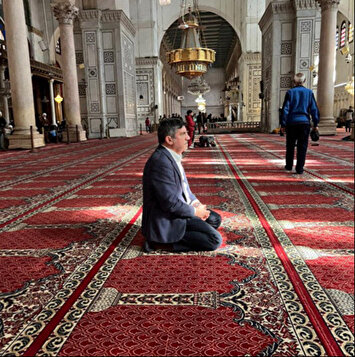
"A Country Cannot Be Governed by Personal Opinions"
When you took office, people expected you to intervene in their way of life. Some voices from the West assumed you would impose "Sharia" on people's personal and daily lives. However, we heard you speak about hisbah (enjoining good and forbidding evil). What do you say about the difference between people's perceptions of you and your actual methods and approach?
I suggest leaving this matter to experts, especially those who know Syrian law well. It should also be entrusted to those familiar with the traditions and history of the country. Governing a country based on personal opinions is not appropriate. It's not my place to say, "I want to impose this." My responsibility is simply to implement the law.
"We Achieved a Victory Without Revenge"
When the revolution began, people were surprised and had fears about you. There was an expectation that you would retaliate with violence similar to what was inflicted upon you and take revenge. However, the feared retaliation and aggression never materialized. What message did you intend to convey with this? Was this a deliberate approach, and what philosophy guided it?
First and foremost, it is what our religion commands and what our ethics demand. We do not fight to kill but to eliminate injustice for the people. We must uphold Islamic ethics, even as Muslims carry out military duties during war. Many people are innocent. What the regime did over 14 years was bomb our villages, but we did not bomb regime-affiliated villages in return. Why? Because those people were not guilty.
The regime, on the other hand, deliberately bombed infrastructure, hospitals, homes, children, and women, as you saw on live television. Throughout this revolution, we treated the people with kindness and compassion because our struggle fundamentally aimed to liberate them from injustice. We guided the young fighters as much as possible, showing mercy even in victory. We prayed to Allah for this: a victory without revenge.
If a revolutionary loses their morals, they lose everything. Praise be to Allah, we achieved this. Others responded positively when they felt safe, recognizing the stark contrast between the revolution and the regime. Had it been the opposite, many crimes would have been committed. Yes, we are victorious, but we acted morally. This was not a political tactic—it was our duty and responsibility.
"The Revolution Emerged from Mosques"
In many popular movements worldwide, the first targets often include banks and businesses to loot, even by those opposing the regime. Yet in your revolution, we saw your forces rush to mosques for prayer and attack prisons to free people. Why was that?
That’s correct. This was among the noble objectives of the revolution. Noble people do not engage in theft, even during revolutions. Fundamentally, the revolution emerged from mosques. If it arises, it must do so because it is a matter of truth (Haq).
Islam commands us to be just, to refrain from harming others, and not to violate public property. This was emphasized during the revolution, especially on the military side, by a previous generation. However, there were some issues and violations, but thankfully, they were brought under control.
Hello, the comments you share on our site are a valuable resource for other users. Please respect other users and different opinions. Do not use rude, offensive, derogatory, or discriminatory language.
The floor is all yours.








